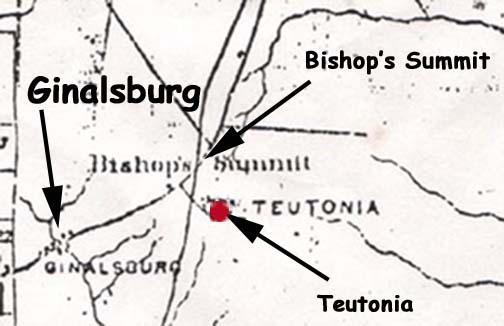| Adam Heinrich (Henry) Ginal was born March 10, 1802 in Augsburg, Germany.
He studied theology at the University of Augsburg, and after graduation
emigrated to the United States in January 1829.
He spent the next seven years as a minister at a Lutheran municipality
in York County, Pennsylvania. In 1836 he was instrumental in the creation
of the German Evangelist Municipality in Philadelphia, which deviated
from Church doctrine in the principles of rationalistic theology. Ginal
left office in 1841 but remained committed to the creation of a German
colony in the United States for Germans without means.
Meanwhile the German Settlement Society he was involved with in Philadelphia
looked west, to Missouri. Concerned because of the English influence on
the German youth, and the loss of their German traditions and customs,
the society had a grand vision of founding a city where German culture
could flourish in the New World. In early Spring 1837 the settlement society
sent a scouting committee to visit locations in the Midwest for their
new city, which was the first planned community west of the Mississippi.
They deputized George Bayer, a teacher, to lay claim to the land that
is now Hermann, Missouri, because the geography reminded them of the Rhineland
in Germany. Bayer purchased over 11,300 acres at a cost of $15,600. Bayer
was later appointed as General Agent for the new city at a salary of $600
a year. The first group of settlers----nine adults and 8 children----arrived
in December 1837 on the last steamboat of the season from St. Charles,
Missouri. By the time of Bayer's death 2 years later there were 450 people,
90 houses, 5 stores, 2 hotels and a post office.
Ginal next became active in the creation of the communistic-oriented colony
Teutonia here in McKean County, which grew---and lasted---until 1845.
Meanwhile Ginal (one of five trustees of Teutonia) traveled to Milwaukee,
Wisconsin to create among the numerous German immigrants there a Free-Christian
municipality. This dissolved after a year, and Ginal returned to Philadelphia
and found employment at the German Rationalist Municipality (which dissolved
in 1855).
Ginal stayed active as a teacher and literary translator in Philadelphia.
When the US Civil War broke out he enlisted as a chaplain with a Philadelphia
unit. Ill-health forced retirement a year later. He died July 6, 1887
in Philadelphia.
Back To Top |

